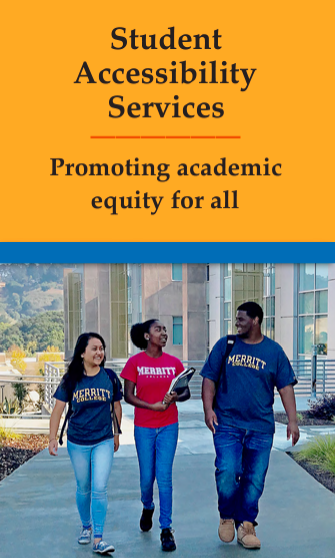Frequently Asked Questions About Students with Disabilities
1. What is the function of the Student Accessibility Services (SAS)?
2. What are the obligations of students with disabilities?
3. How does SAS know if a student has a disability?
4. Who qualifies for SAS services?
5. What is an educational limitation?
6. What are support services?
7. How is one determined eligible for SAS?
8. How do students know what services they need?
9. Is a student’s disability information kept confidential?
10.May I contact SAS for more information about a student’s disability?
11. Will the requested accommodations compromise the standards, goals, and objectives of my class?
12. Why do some students get more time on assignments and tests than others?
13. If a student is already doing well in the class, why is it necessary to provide any accommodations?
14. What if I have questions about the request for accommodations, or I disagree with them?
15. May I start an exam with the student in the class and then move the student to another location?
16. Should I accommodate a student without a request of accommodation from SAS?
17. Are all students with disabilities registered with SAS?
18. What should I do if a student presents a request for accommodation only a few hours before an examination?
19. Are general education and/or major requirements ever waived or altered for students with disabilities?
1. What is the function of the Student Accessibility Services (SAS)?
The Disability Services Program assists the college in complying with Section 504 of the Rehabilitation Act of 1973, which states that “no qualified individual with disabilities shall, on the basis of their disability, be excluded from the participation in, be denied the benefits of or be subject to discrimination under any post-secondary program or activity receiving federal financial assistance”.
2. What are the obligations of students with disabilities?
In order to enjoy the protections of Section 504 and the ADA, the student has an obligation to self-identify that he or she has a disability and needs accommodation. The institution may require that the student provide appropriate documentation at student expense in order to establish the disability and the need for accommodation. [See Rights and Responsibilities]
3. How does DSP know if a student has a disability?
According to Section 504 of the Rehabilitation Act of 1973, “A person with a disability includes any person who has a physical or mental impairment which substantially limits one or more of such person’s major life activities; has a record of such an impairment; or is regarded as having such an impairment”. The law recognizes education as being a major life activity. Verification of a disability must be on file in order for DSP to provide services. Verification may be in letter format, on a form provided to the verifying professional, or make by qualified personnel in the DSP office.
4. Who qualifies for SAS services?
A student with a disability is a person enrolled at a community college who has a verified impairment which limits one or more major life activities and which imposes an educational limitation.
5. What is an educational limitation?
An educational limitation means disability related functional limitation in the educational setting. This occurs when the limitation prevents the student from fully benefiting from classes, activities, or services offered by the college to non-disabled students, without specific additional support services or instruction as defined in Section 56005.
6. What are support services?
Support services are those specialized services available to students with disabilities, which are in addition to the regular services provided to all students. Such services enable students to participate in regular activities, programs and classes offered by the college. (e.g., note takers, readers for the blind, alternative testing). [See Glossary of Services and Accommodations]
7. How is one determined eligible for DSP?
In order to be eligible for support services as authorized by Title 5 and Section 504, a student with a disability must have an impairment, which is verified by one of the following means:
• Observation by DSP professional staff with review by the DSP Coordinator; or
• Assessment by appropriate DSP professional staff; or
• Certified or licensed professionals outside of DSP qualified to make a valid assessment.
8. How do students know what services they need?
After the student’s educational limitations have been identified by appropriate DSP professional staff or other qualified professional, the DSP Counselor will meet with the student to complete a Student Educational Contract (SEC), which not only lists the educational goals of the students, but identifies the appropriate services to accommodate the educational limitations.
9. Is a student’s disability information kept confidential?
All information is strictly confidential, and no written information is released without a student signing an informed consent. Accommodations are determined in consultation with the student and the DSP staff and must be appropriate to the student’s disability. [See Confidentiality]
10. May I contact DSP for more information about a student’s disability?
No, the student’s disability is confidential. However, the DSP Counselor or Learning Disabilities Specialist (for students with learning disabilities) can provide information about the student’s educational needs in class. [See DSP Contact Us]
11. Will the requested accommodations compromise the standards, goals, and objectives of my class?
Accommodations are an opportunity for the student to be evaluated on the student’s knowledge and performance in the class and not on the effects of the student’s disability. According to guidelines from the Department of Education, institutions of higher education must modify academic requirements that are discriminatory. Modification may include extending time for completing degree requirements, allowing course substitutions, and adapting the manner in which particular courses are conducted. Institutions are not required to compromise on requirements that are essential to the program or course of instruction, or that are directly related to licensing requirements (Section 104.44a).
12. Why do some students get more time on assignments and tests than others?
The request for additional time for the student to work on an assignment or test varies from student to student depending on the severity of the student’s disability. [See Testing Accommodations]
13. If a student is already doing well in the class, why is it necessary to provide any accommodations?
Title 504 of the Rehabilitation Act of 1973 and Title II of the Americans with Disabilities Act of 1990 establish that students with disabilities must have equal opportunity. A student’s good performance in class, including finishing exams on time, does not support the argument that the student is being provided equal opportunity. The student may still require accommodations in order to have equal opportunity in the classroom. [See ADA]
14. What if I have questions about the request for accommodations, or I disagree with them?
The instructor should contact the DSP Counselor who works with the student. [See Contact Us]
15. May I start the exam with the student in the class and then move the student to another location?
Students with disabilities (as most other students) do not perform optimally when interrupted while taking a test. Moving the student is not generally desirable and is discouraged and can be a violation of their right to accommodations and equal opportunity.
16. Should I accommodate a student without a request of accommodation from DSP?
Students often discuss their accommodation needs directly with the instructor; however, if you want a valid verification of disability provided by DSP, the student must be registered with the DSP office and have the necessary documentation of disability on file before a Services and Accommodations Form is issued. Student registration with DSP assures the instructor that student has a verified disability on file.
17. Are all students with disabilities registered with DSP?
No. Some students may not be registered with DSP (registration is voluntary); however, in order for DSP to serve the student with a verified disability, registration with DSP is necessary.
18. What should I do if a student presents a request for accommodation only a few hours before an examination?
A good-faith effort should be made to provide reasonable accommodations whenever they are requested. You may contact the DSP Office to confirm that the student has a verified disability.
19. Are general education and/or major requirements ever waived or altered for students with disabilities?
Under the provisions of Title 504 of the Rehabilitation Act of 1973 and the Americans with Disabilities Act of 1990, institutions of higher learning must not exclude a qualified student with a disability from any course of study, and must not establish rules and policies that may adversely affect students with disabilities. On a case-by-case basis, community colleges may find it necessary to modify requirements in order to accommodate the student’s disability. Modifications might include substitutions or waivers of courses or degree requirements.
NOTE: The student’s DSP Counselor can be contacted for a consultation for additional information. Also, the Internet can be a good resource or visit our web page on Working with Students. [See DSP Contact Us]




